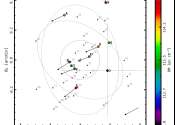Three new millisecond pulsars detected with MeerKAT
Using the MeerKAT radio telescope in South Africa, an international team of astronomers has detected three new millisecond pulsars in the globular cluster Messier 62 (also known as NGC 6266). The finding was detailed in a ...









